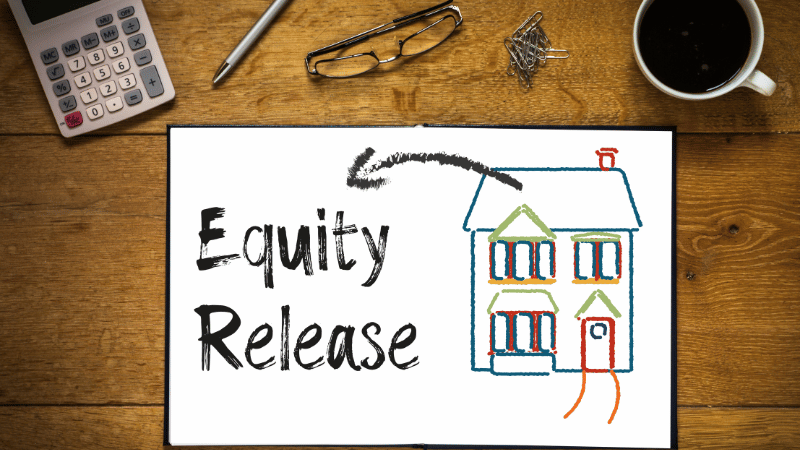Categories
Drawdown Equity Release | What You Should Know

When looking at a lifetime mortgage for equity release on your home, one of the greatest concerns that people have is the interest that will be accrued during the life of the mortgage, and how that will affect the amount they leave for their descendants as part of their inheritance.
One option is the drawdown equity release or drawdown lifetime mortgage which provides additional flexibility that typically means less interest is paid.
Read on to find out more about drawdown equity release and how it can help you access to funds in your retirement.
And to speak to an adviser at any point to get advice on what's best for your situation, please get in touch.
Key Takeaways
- Drawdown lifetime mortgages only charge interest on money you withdraw – you don’t pay interest on the unused portion of the facility, which can significantly reduce long-term interest costs compared with a lump-sum loan.
- Greater flexibility and control – drawdown lets you access funds as-and-when needed, giving peace of mind and reducing the risk of borrowing more than you actually use.
- Potential savings if interest rates fall – each future drawdown is charged at prevailing rates, so you may pay less overall if rates decrease after you take the initial advance.
- Can protect means-tested benefits – by keeping withdrawals low and infrequent, you may preserve eligibility for Pension Credit and other means-tested support.
- Impact on your estate remains a key consideration – any drawn balance plus rolled-up interest reduces the value of your estate and so affects inheritance left to heirs.
- No negative equity guarantee – as with other lifetime mortgages, lenders cannot demand more than the value of the property when the loan is repaid.
- Drawdown may carry slightly higher rates – some lenders charge a premium for the added flexibility, so if you intend to use all funds immediately a lump sum might be cheaper.
- Weigh interest against potential house price growth – rising property values can offset accrued interest, so consider both sides when assessing estate impact.
- FCA-regulated product - independent equity release advice is required; contact us to speak to an adviser to model outcomes and choose the right product for your needs.
Check Your Eligibility
What is Drawdown Equity Release?
A drawdown lifetime mortgage works by only releasing the funds to you as you need them, and you only pay interest on the amount drawn, thus significantly lowering the total interest paid over the lifetime of the mortgage.
This differs to a traditional lump-sum lifetime mortgage where the entire value of the loan is provided immediately and interest is accrued on this full amount from the outset.
Before we go on, let's take a step back and look at equity release more broadly to give some context.
What is Equity Release?
Equity release is an umbrella term for a range of financial products for homeowners that are designed to leverage the value you have in your home to provide you with funds in your retirement and later life.
In all cases, you are able to stay living in your home for the remainder of your life, making equity release a better option for many people than selling the home and downsizing.
The common features of equity release include:
- It is designed to leverage the equity you have in your home to release money to you now.
- Equity release is structured such that you don’t need to make any repayments and the debt is repaid in full upon your passing, or leaving the property to enter long-term residential care.
- You retain the full right to live in your property until you no longer need it.
- The amount of money you can obtain through equity release is linked to the level of equity you have in your property and the value of that property.
The Advantages of Drawdown Equity Release
One of the worries that happens when looking at a lifetime mortgage, is the amount of interest generated.
Interest is added to the principal of the mortgage each month and increases that principal, such that each month the interest generated is a little larger than previously.
As you pay interest on the full amount borrowed, even if you don’t spend that money, there can be a feeling that you are adding to the total of the mortgage debt unnecessarily.
An Example of Drawdown vs. Lump-Sum Lifetime Mortgages
When considering a lifetime mortgage, applicants should always ask themselves ‘how much’ money they anticipate needing, and ‘when’.
This will help decide whether they should take the full loan amount upfront or access funds progressively as needed.
Background:
John and Mary, both in their early 70s, owned their home outright and wanted to supplement their retirement income. They needed additional funds for home improvements, increased travel costs as well as topping up their income which had reduced substantially after they both retired. While they considered taking a lump sum, they were concerned about accruing interest on money they might not need immediately, especially whilst interest rates were high.
Before speaking with a later life specialist, they estimated that they would need around £100,000 to adequately cover their immediate and long-term needs. They only needed £20,000 initially but were conscious that interest would be charged on the whole amount borrowed, therefore planned to put the remaining £80,000 in high-interest savings accounts and ISAs until they needed the funds. They thought this would be a good way of offsetting the interest being charged.
Solution:
When consulting with a financial adviser, they explained that drawdown facilities were essentially the same thing as an ‘overdraft’, where a lender agrees a total drawdown facility size that can be accessed in the future, with interest only being charged on each drawdown from that point on. Furthermore, the prevailing interest rate would be charged at that time as well (therefore if interest rates reduce, applicants will benefit from those cheaper rates being charged on each drawdown amount.
This allowed them to access an initial smaller amount of £20,000 (at a rate of 6.5% AER) while retaining full access to the remaining £80,000 future needs (without interest being charged). Furthermore, if interest rates do decrease as they expect, each time they draw-down funds in the future, they will be charged a lower interest rate on each of those additional borrowings.
Key Benefits:
- Reduced Interest Accumulation – By only withdrawing what they needed, John and Mary minimised the interest that is charged on a lower lump sum, preserving more equity in their home. Furthermore, by benefiting from expected rate decreases, the average interest rate they will be charged across their different ‘drawdowns’ will be lower than if they fixed today's rates on the whole facility.
- Flexibility and Control – They had peace of mind knowing they could access additional funds if required but weren’t obligated to take more than necessary.
- Impact on Benefits – Whilst John and Mary weren’t entitled to any means-tested benefits anyway, for other applicants who may be in receipt of Pension Credit, by keeping withdrawals low and infrequent (therefore keeping their physical savings less than the applicable level of either £6,000 or £10,000), they would maintain their eligibility for means-tested benefits, but still be able to access enough to effectively top-up their income without it being treated as an income source.
- Tax-Free Funds When Needed – Unlike other financial products, their drawdowns were tax-free and could be timed strategically to cover specific expenses without unnecessary borrowing (which is especially useful if applicants would otherwise have to access funds from a pension, with the tax/cost implications that come with that option).
By not taking the full £100,000 immediately, they should save thousands of pounds in interest compared to a lump-sum option.
Furthermore, keeping the initial borrowing and therefore the outstanding balance at any time smaller, will give them much more flexibility in the future if they ever decide to re-mortgage to a cheaper product (with lower prohibitive early repayment charges being applicable at that time, than if they released the full £100,000 initially).
Although there are some risks (i.e. interest rates may actually increase in the future instead), by utilising a drawdown facility they achieved greater financial security, reduced long-term costs, and maintained control over their retirement funds.
Did You Know?
Because high street banks have strict age caps on their mortgage products, borrowing options shrink dramatically after age 70+. However, we now have access to a new defined term interest-only mortgage designed specifically for older borrowers, with options available well into your 80s.
Key features include:
- Borrow up to age 85 (higher for joint applications)
- Flexible income assessment – pensions, rental, part-time work, etc.
- Borrow more than with standard lenders (often 6× income+)
- Available for refinancing, debt consolidation, helping family, etc.
- Very competitive rates compared to similar later-life products
- Up to 75% LTV (in some cases 80%)
- Fast approval times with pre-eligibility checks before application
Call us today or book a free consultation to see how much you could borrow and to get advice on whether this could be the right fit for you compared to other later life mortgages, and to learn more, read our guide to interest only mortgages over 70 .
Recent Equity Release Case Studies
Drawdown Equity Release Pros and Cons
Drawdown equity release is a powerful way to leverage the money you have tied up in your home and is becoming a more popular way to manage retirement finances, however, it is important that you weigh up the positives and negatives before going ahead with a drawdown lifetime mortgage arrangement.

Con: The impact on your estate
The biggest effect of any equity release product is that it is repaid through the sale of your home in future years.
While drawdown equity release significantly mitigates this impact through to careful and sensible management of the amount drawn against the property, it is still a significant consideration and the single greatest negative to drawdown lifetime mortgages.
As the mortgage is potentially extremely long term, the interest accrued can be large and may become many times the value of the initial loan. This cost is eventually paid by your estate, meaning it lowers the amount of inheritance available to your heirs.
A Retirement Interest-Only mortgage, on the other hand, sidesteps this problem.

Pro: The balance with the rising price of housing
It is essential when evaluating the cost of a drawdown lifetime mortgage to consider the potential rise in value of your home.
There is every chance that the market value of your property rises in line with - or even exceeds - the interest portion of your lifetime mortgage.
This means that though the numbers for compound interest look high, they can be offset by the amount your property value increases in the same time.
The impact that they therefore have on your inheritance is typically no greater than it would when comparing the initial loan to the value of your property today - in other words, the interest can be balanced by the rise in your property value and the additional end impact on your estate could be potentially zero.

Pro: Access to money today
Without becoming too morbid, you cannot make use of the money in your home once you die. We all have a strong desire to help our children once we have passed, but often it is much more valuable to have access to the funds today.
Equity release means that you will not have to struggle through your retirement with money tied up in your home, and drawdown equity release enables you to access that value in a sensible and balanced way.

Pro: Flexibility
You do not have to set when you plan to draw the rest of the agreed money out of your house today; you can simply wait until the future and take the money as-and-when you need it.
The flexibility of a drawdown lifetime mortgage means you are not paying interest on any money just in case you need it later.

Pro: The saving on interest
We covered this in depth earlier, but it really cannot be understated how much the savings made on the interest make a drawdown lifetime mortgage a lot more palatable for many homeowners than a lump-sum lifetime mortgage.

Pro: The no negative equity guarantee
Like other lifetime mortgages, drawdown equity release is obtained with a no negative equity guarantee that ensures that even if the final value of the debt plus all accrued interest exceeds the value of your home, that there is no extra debt placed on the estate.

Con: Potentially higher interest rate
Because of the additional flexibility in the arrangement, some lenders will want to charge a slightly higher interest rate for a drawdown lifetime mortgage than with a lump-sum lifetime mortgage.
Getting Advice on Equity Release
Lifetime mortgages and all equity release products are overseen by the FCA in the UK, which monitors lenders to ensure that customers are protected and not sold inappropriate products that may put them into financial difficulty.
These extra checks are there to help you and though they occasionally mean a little more paperwork, the end result is a much safer mortgage lending environment that you can trust.
One part of the FCAs standards for equity release is that you obtain independent specialist equity release advice before signing up to any agreement.
Your adviser will:
- Discuss every aspect of the equity release landscape with you in easy to understand language, to ensure you are making an informed decision regarding which option you would like to consider.
- Assess that you are making the decision with the full understanding of the impact on your finances and any future inheritance, and that you are not under pressure from an outside third party or family member to do something that is not in your best interest.
- Work with you to obtain the best rates on the market, leveraging relationships and access to specialist lenders to find the finest deals.
- Help you throughout the application process and beyond, making sure you are always fully informed and happy with the process at every step.
To discuss drawdown equity release or any other mortgage product designed to help you in your retirement, contact us today.






















